The Appellate Division of the Supreme Court has fixed Wednesday as the date for hearing the appeal against the acquittal of all the accused, including BNP acting chairman Tarique Rahman, who was sentenced to life imprisonment, and former State Minister for Home Affairs Lutfuzzaman Babar, who was sentenced to death, in the much-discussed August 21 grenade attack case.
The appeal bench, headed by pro-BNP Chief Justice Dr. Syed Refaat Ahmed, gave the order on Tuesday after the third day of hearing against the High Court verdict.
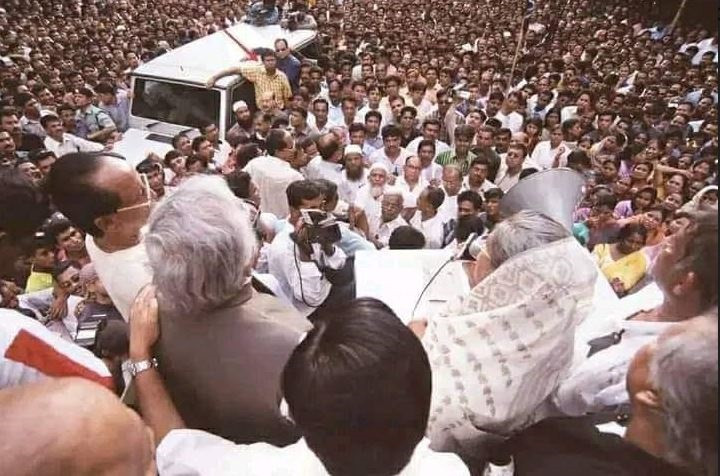
Deputy Attorney General Abdullah Al Mahmud Masud heard the state’s case in court. Jamaat-linked lawyers SM Shahjahan and Mohammad Shishir Monir will argue in the case on behalf of Tarique and Babar.
BNP lawyers present in the court include senior lawyer Zainul Abedin, Barrister Mahbub Uddin Khokon, Barrister Kaiser Kamal, Barrister Ruhul Quddus Kajal, Advocate Gazi Kamrul Islam Sajal, Advocate Aminul Islam, and Advocate Maqsud Ullah, among others.
Sheikh Hasina announces 21-point demands for nation-building
How the deep state engineered Sheikh Hasina’s ouster in August 2024
Money Laundering: How Yunus regime used ACC, Supreme Court to acquit Tarique, Mamun
On December 1, the High Court acquitted all the accused in the much-discussed case. The High Court bench comprising Justice AKM Asaduzzaman and Justice Syed Enayet Hossain announced the verdict after overturning the trial court’s verdict. The case was heard for a total of four days.
All the convicts got bail following the verdict, while Tarique has been staying in London since 2008.
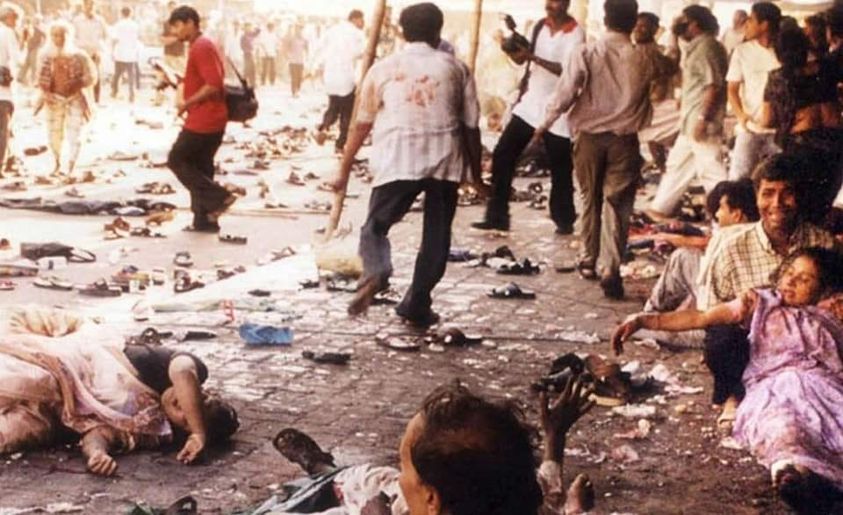
On October 10, 2018, the trial court sentenced 19 people to death, including Babar and BNP leader Abdus Salam Pintu. At the same time, 19 people, including BNP Senior Vice Chairman (currently acting chairman) Tarique Rahman, were sentenced to life imprisonment.
The other 11 accused were sentenced to various terms of imprisonment. Later, on November 27 of that year, the trial court’s verdict in the case reached the Death Reference Branch of the High Court along with the necessary documents. The imprisoned defendants also appealed. In December 2022, the appeal hearing of the case began in a bench headed by Justice Shahidul Karim. In the meantime, the bench was reconstituted.
The convicts
The defendants sentenced to death by the trial court are: Babar, Pintu, his brother Maulana Tajuddin, former HuJI amir and Islamic Democratic Party convener Maulana Sheikh Abdus Salam (died in prison), Kashmiri militant Abdul Majed Bhat, Abdul Malek alias Ghulam Mustafa, Maulana Shawkat Osman, Mohibullah alias Mofizur Rahman, Maulana Abu Sayeed alias Dr. Zafar, Abul Kalam Azad alias Bulbul, Md. Jahangir Alam, Hafez Maulana Abu Taher, Hossain Ahmed Tamim, Moin Uddin Sheikh alias Mufti Moin, Md. Rafiqul Islam, Md. Ujjwal, former Director General of NSI Major General (retd) Rezzakul Haider Chowdhury, Brigadier General (retd) Abdur Rahim (died in prison), and BNP leader Mohammad Hanif, owner of Hanif Paribahan. The court convicted them under sections 302/120B/34 of the Penal Code for murder through premeditated and criminal conspiracy and ordered them to be hanged until death and fined them Tk100,000 each.
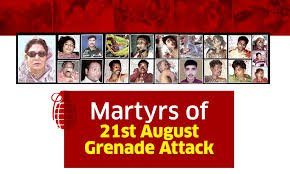
Those sentenced to life imprisonment are Tarique Rahman, Khaleda Zia’s former political advisor Harris Chowdhury, BNP leader Kazi Shah Mofazzal Hossain Kaikobad, HuJI member Hafez Maulana Yahia, Shahadat Ullah alias Jewel, Maulana Abdur Rouf (who died in prison), Maulana Sabbir Ahmed, Arif Hasan alias Sumon, Abu Bakr alias Hafez Selim Maulader, and Md. Ariful Islam, Mohibul Muttakin alias Muttakin, Anisul Mursalin alias Mursalin, Md. Khalil alias Khalilur Rahman, Jahangir Alam Badr, Md. Iqbal alias Iqbal Hossain, Liton alias Maulana Liton, Mufti Shafiqur Rahman, Mufti Abdul Hai, and Ratul Ahmed alias Ratul Babu. They were convicted under Sections 302/120B/34 of the Penal Code and sentenced to life imprisonment, a fine of Tk 50,000 each, and another year of rigorous imprisonment in default. In addition, former Inspector General of Police (IG) Md. Ashraful Huda and Shahudul Haque, BNP Chairperson and then Prime Minister Khaleda Zia’s nephew Lieutenant Commander (Retd) Saiful Islam Duke, Lieutenant Colonel (Retd) Saiful Islam Joardar, DGFI Major General (Retd) ATM Amin, former Deputy Commissioner (South) of DMP Khan Saeed Hasan, another former Deputy Commissioner (East) Obaidur Rahman Khan, former Additional Inspector General Khoda Box Chowdhury, former Special Superintendent of CID Md. Ruhul Amin, former ASP Abdur Rashid, and former ASP Munshi Atiqur Rahman were sentenced to two years in prison and a fine of Tk 50,000, with six months of rigorous imprisonment in default.
In another section, the court sentenced Khoda Box Chowdhury, now chief adviser Muhammad Yunus’ special assistant, Ruhul Amin, Abdur Rashid, and Munshi Atiqur Rahman to three years in prison and a fine of Tk 50,000, with six months in default.
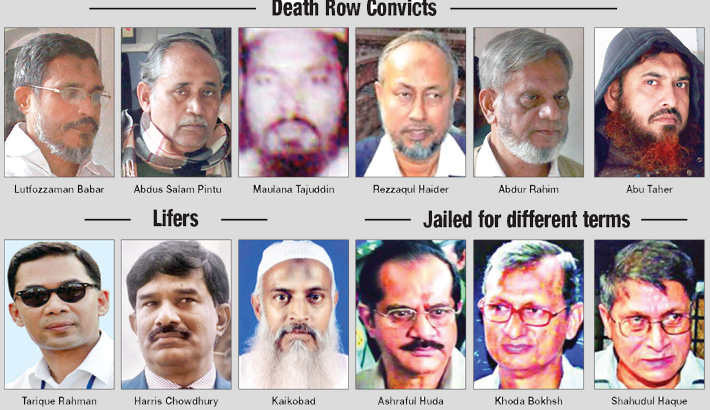
Later, the death reference and jail appeal against the verdict came to the High Court for hearing. After that, the hearing of the case reached its final stage during the Awami League-led government, but after the change of government, the hearing of the case resumed on October 31. However, after the hearing, the High Court kept the case pending (CAV) for the verdict on November 21. Deputy Attorney General Md. Jasim Sarkar was present in the court for the state. On the other hand, lawyers SM Shahjahan and Shishir Monir were present for the accused.
Amid a series of bomb attacks since 2001, a horrific grenade attack was carried out at an anti-terrorism rally by the Awami League on Bangabandhu Avenue on August 21, 2004.
Awami League President and then Opposition Leader Sheikh Hasina narrowly escaped the attack with severe damage to her right ear. However, 24 people, including Awami League Women’s Affairs Secretary Ivy Rahman, wife of former President (late) Zillur Rahman, and head of Sheikh Hasina’s security team Mahbubur Rashid, were killed in the attack. More than 400 party leaders and activists were injured.
Police charged batons on the Awami League activists and damaged evidence at the crime scene. Moreover, the injured did not get treatment at Dhaka Medical College Hospital. Meanwhile, the BNP-Jamaat leadership blamed the Awami League and an Indian intelligence agency for orchestrating the attack.
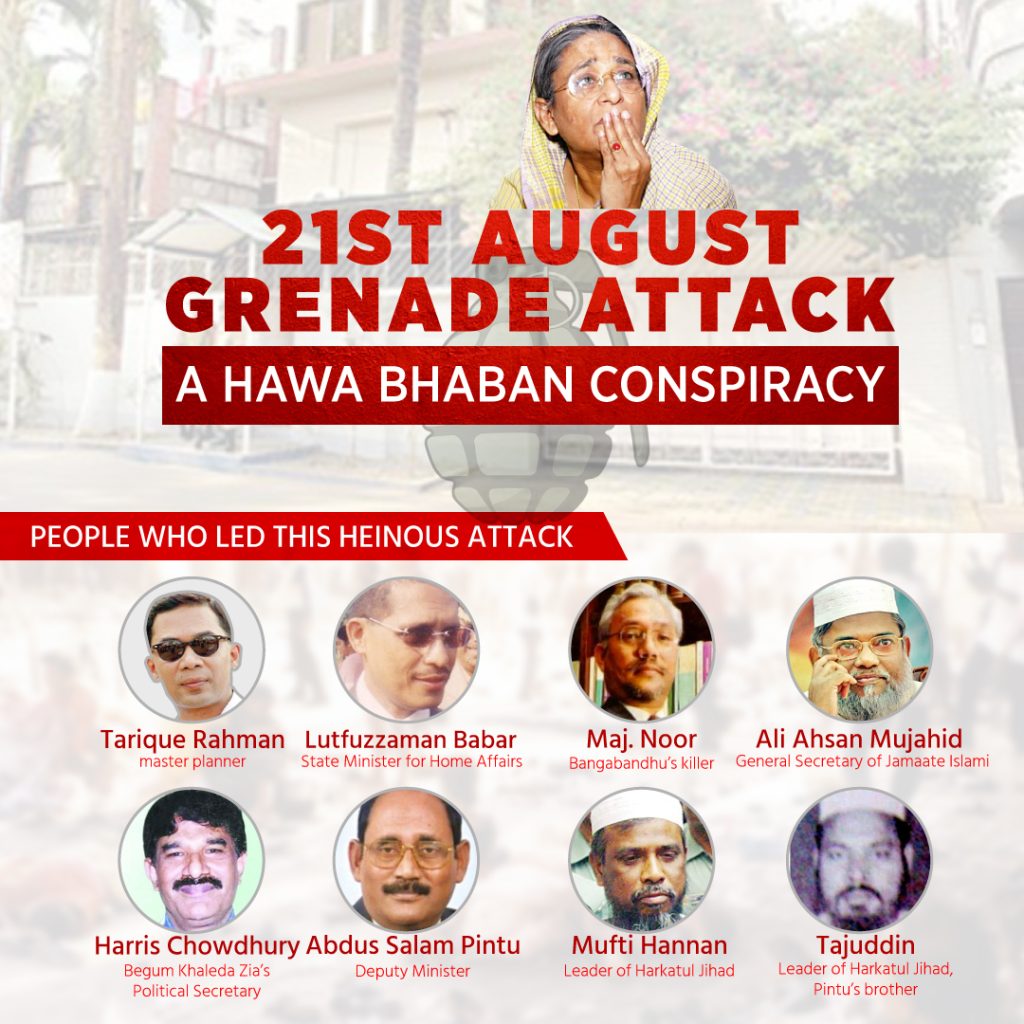
The day after the incident, Motijheel police station Sub-Inspector (SI) Faruk Ahmed filed a case as the plaintiff. After the investigation, BNP leader Abdus Salam Pintu, his brother Maulana Tajuddin, and HuJI leader Mufti Abdul Hannan were named as accused in the charge sheet filed on June 11, 2008, during the caretaker government. After the Awami League government came to power in 2009, the court ordered a further investigation after the state’s application.
After two years of investigation, a supplementary charge sheet was filed on July 3, 2011, accusing 30 people. As a result, the total number of accused in the case was 52. Of the total 52 accused, the death sentences of Ali Ahsan Mohammad Mujahid and Mufti Hannan and his associate Shahedul Islam Bipul were executed in another case. With the execution of the death sentences of three, the number of accused in the case rose to 49. Of these 49, some 31 were in prison at the time of the verdict. The remaining 18 were absconding. They are Tarique Rahman, Haris Chowdhury, Kazi Shah Mofazzal Hossain Kaikobad, ATM Amin, Saiful Islam Joarder, Khan Saeed Hasan, Obaidur Rahman, Mufti Shafiqur Rahman, Mufti Abdul Hai, Ratul Babu, Mohammad Hanif, Abdul Malek, Shawkat Osman, Maulana Tajuddin, Iqbal Hossain, Maulana Abu Bakr, Khalilur Rahman, and Jahangir Alam.
The motive behind the attack
From the charge sheet, evidence and testimonies of the prosecution, and confessions of Harkat ul Jihad (HuJi) chief Mufti Hannan and Khaleda Zia’s nephew and then APS-1 Saiful Islam Duke, it becomes clear that the motive of the attack was thus:
Tarique Rahman targeted Sheikh Hasina and Awami League leadership for elimination. For this task, terrorists of HuJi were to be used. HuJI, of course, given their own twisted ideology, needed little persuasion, as they considered Sheikh Hasina an “Enemy of Islam” for her secular leadership.
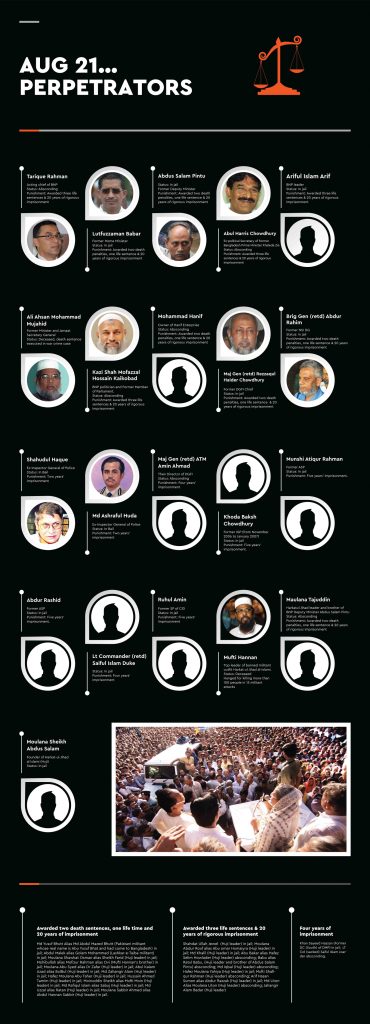
The planning of the attack and final details were finalised a few days before the attack in the political office of Tarique Rahman in Gulshan, Dhaka, called “Hawa Bhaban.” HuJi terrorists met with, took directions from, and were assured of all administrative support from Tarique Rahman and other influential participants of that planning meeting, which included Lutfozzaman Babar, then State Minister for Home; Harris Chowdhury, Political Secretary to then Prime Minister Khaleda Zia; Ali Ahsan Mohammad Mojaheed, Secretary General of Jamaat-e-Islami and the then social welfare minister; Abdus Salam Pintu, the then Deputy Minister for Education; NSI Director General Brig Gen Abdur Rahim; and DGFI Director Brig Gen Rezzaqul Haider Chowdhury. The confessional statement of Mufti Hannan states that the fugitive convicted killer of Bangabandhu, Major Noor Chowdhury, was also an active participant in that meeting.
Then BNP lawmaker Shah Mofazzal Hossain Kaikobad arranged meetings between the HuJi attackers and BNP-Jamaat plotters at Tarique Rahman’s political office, Hawa Bhaban. Apart from the meeting at Hawa Bhaban, other planning meetings took place at a Huji Den in Mohammadpur and the Dhanmondi residence of BNP Deputy Minister Abdus Salam Pintu, during which time the grenades were handed over to HujI killers by Tajuddin.
More information about the grenades used comes from one of the other accused, Abu Yusuf Bhat, a Pakistani terrorist, who in his confessional statement stated that one Mujaffar Shah, a leader of the Pakistan-based militant outfit Tehrik-e-Jihadi (TJI), gave the grenades to Tajuddin. He also talked about how HuJi was assured of BNP government support by Deputy Minister Abdus Salam Pintu.
Operation ‘Light Snacks for Sheikh Hasina’
On August 20, the day before the attack, HuJI killers Kajol and Abu Jandal went to Bangabandhu Avenue to inspect the scene of the attack. The name of the operation was “Light Snacks for Sheikh Hasina.” On August 21, they met at a designated Badda house to group. It was decided that a total of 12 would participate in the attack, led by Kajol and Abu Jandal.
They then prayed together and had lunch. After the final meeting, Maulana Sayeed gave a sermon on Jihad. Mufti Hannan then handed over 15 grenades to the 12 designated killers.
As agreed, after Asr prayers, they all regrouped near Golap Shah Mazar. After that they took positions around the truck where the Awami League leaders would address the rally. After Sheikh Hasina’s speech, Abu Jandal hurled the first grenade. Then, each of them hurled their grenades and left the scene. As agreed with the plotters earlier, they received help from security and intelligence officials to flee the scene of the crime in broad daylight.
2004-06: Obstructing investigation and justice
Given that the top government and security officials of BNP and Jamaat were themselves involved in the planning and execution of the attack, in hindsight, it appears hardly surprising that they did everything in their power to ensure that there was never any proper investigation of the 21st August attack. In fact, they did just the opposite to divert the process, derail the investigation, and helped the attackers escape justice.
This was obvious from the moment of the attack itself. Usually, a volunteer group comprising Sechchasebak and Chhatra League leaders and workers was engaged in maintaining the security of any Awami League meeting, and they did it from the rooftops of nearby buildings. But on 21 August 2004, such volunteers were not allowed to get on the rooftops of the buildings, as those were closed.
Immediately following the grenade explosions, the police on duty there helped the attackers flee by firing tear gas shells and charging batons on the Awami League men who had been rescuing the injured. In the immediate aftermath of such an attack, any basic forensic sense would dictate that the crime scene be cordoned off for the collection of samples and evidence, but the entire scene was washed with water and detergent to destroy any evidence. Even the recovered grenades were not preserved but rather destroyed!
As a means of cover-up, the then BNP-Jamaat government formed a one-man judicial commission headed by Justice Joynal Abedin, which performed a mockery of an investigation and concluded that ‘foreign and local enemies’ had carried out the attack. Two years later, that same Justice Joynal was elevated to the Appellate Division of the Supreme Court, presumably as a means of rewarding him for his ‘report.’
One of the principal tactics employed by the then BNP-Jamaat government to derail the justice process was to implicate innocent people in the case. For instance, petty criminal Joj Mia was falsely implicated in the August 21 grenade attack cases. Officials of the Criminal Investigation Department arrested Joj Mia from his home on June 10, 2005. He was later found innocent and released from jail after around three years. Another such victim was Partho, who still suffers from posttraumatic stress as a result of the torture-induced forced confessions.
One of the principal liaisons, planners, and attackers was terrorist Tajuddin, who was also BNP Deputy Minister Abdus Salam Pintu’s younger brother. He was helped to flee Bangladesh to Pakistan after the attack, at the behest of Tarique Rahman, by the nephew of Khaleda Zia and her APS-1, Saiful Islam Duke, with others accused in the case from DGFI.
As transpired later, the principal attacker was Mufit Hannan, the chief of HuJi. Hannan and his associate Bipul were not shown arrested in the 21st August attack case by the BNP-Jamaat government, even after they confessed their involvement in the attack and were arrested in another case.